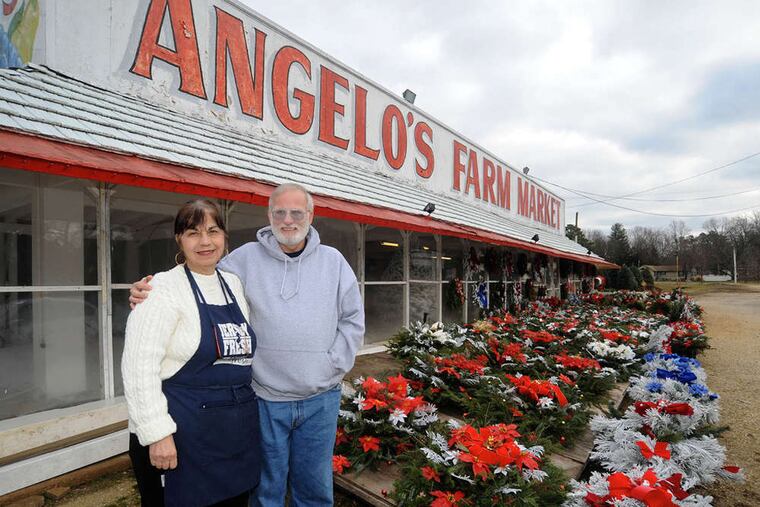Greens and pie, a Christmas treat
While many farm stands are gone now, Angelo's is a sturdy holiday perennial.

EGG HARBOR CITY, N.J. - You may not be in the market for a pie or a poinsettia on any given day.
But step through the threshold at Angelo's Farm Market - one of the few remaining roadside produce stands once so prolific along the major routes to the Jersey Shore - and most likely you'll covet at least one or the other. Or maybe even a fancifully flocked Christmas tree or wreath.
There is a certain something about the farm market along Route 30 where they have been selling locally grown produce, shrubbery, and plants for 70 summers and offering Christmas greenery and pies for sale since the 1960s.
Amid the rickety, wood-framed stand, with its plexiglass windows, concrete floor, strings of old-school Christmas lights, and painted red and white facade, you just may find your holiday bliss among the simplicity of rows and rows of the poinsettias, grave blankets, fresh and flocked Christmas trees, and . . . nothing else.
Off to the side in a separate - but homey - commercial kitchen, fresh pies - only pies - in deep dishes with mile-high flaky crusts are for sale.
"We live in a big-box world where people are used to going to these big, impersonal places to shop," said Lucie Fichetola, whose parents built the simple stand attached to the front side of their family home and opened it in 1944 to a constant stream of customers. "But when it comes to the holidays, a lot of people tell us they like coming here for what they need instead of going to places like that. Maybe it's the nostalgia."
"Back before they built the parkway and the Atlantic City Expressway in the 1960s, there was nonstop traffic out here," recalls Fichetola - who, like the stand, is 70 years old. "It was so busy then, we could have been open 24 hours a day if we had wanted to be."
On a recent weekday, Christmas sales were brisk.
"Our holiday doesn't really get started until we get our tree from Lucie," said Kathy Bongiorno, 48, of Galloway Township, who recently purchased a seven-foot flocked Douglas fir at Angelo's. "I've been going there my whole life for my Christmas trees. They do them so beautifully. It makes our Christmas."
Once dozens
All along the route, from Egg Harbor City to Atlantic City about 20 miles away, there used to be farm stands just like Angelo's, operated by farm families like the Fichetolas.
"A lot of them were owned by my uncles, aunts, my own brothers. There was Carmen's, Rocky's, Joe's, Jean's, Emma's," said Fichetola, spouting off names of places long gone. "On [Route] 40, there was Bob's and Tom's. Tom was a relative, and that place is gone. Bob's is still there."
Where there were once dozens along the routes, also known as the White Horse Pike and the Black Horse Pike, there are only a handful left.
From the 1940s through the 1980s, Fichetola, the youngest of eight children, worked alongside her siblings and their mother, Mary, and father, Angelo, who was the stand's namesake.
In various seasons, they would pick their own produce, string their own garlands, and make their own wreaths. And by the 1960s, when flocked Christmas trees - the kind decorated with a fluffy, snowlike coating - first came into vogue, Angelo's gained a reputation for having the best, Fichetola said.
"There's an art to applying flocking," insists Fichetola, whose husband, James Tidwell, a landscaper by trade, became the resident flocking master when the pair married in 1990. A special coating made of wood pulp that is nontoxic and environmentally friendly is applied to the tree using a paint-sprayer-like machine.
After her father passed away in 1970 and her mother died in 1983, Fichetola assumed the role of keeping the stand afloat, working seven days a week for 10 months of the year. Angelo's closes every January and February and reopens in March in time for Easter and the spring planting season.
Fichetola went to college to be a teacher and planned to eventually go to law school and become a lawyer. But it was on the farm where she has worked nearly every day since she was a child that she says she found her true calling.
"It's an incredible amount of work, and when I'm gone, I doubt anyone will want to take it over," said Fichetola, who also offers jars of fruit preserves and Italian specialty items like tomato sauces and pickled peppers that are made on the premises.
Female-led farms
But Fichetola may have been way ahead of the trend in female-owned farms, according to the U.S. Census of Agriculture.
While women have long assumed important roles on the family farm - often juggling agricultural duties with caring for children, keeping the house, and even holding down an outside job - recent statistics show that one in every 10 U.S. farms is being run primarily by a female. Some states, like Maryland and Pennsylvania, have seen nearly 20 percent increases in the number of farms run by women over the last decade, according to the Department of Agriculture.
Increasing numbers of women as the heads of households and better outreach efforts among female-focused farm organizations may be responsible for the increased numbers, according to Stefphanie Gambrell, spokeswoman for the American Farm Bureau.
In New Jersey, agriculture and food production are the third-largest industries in the state with about 9,000 farms - mostly smaller, family-run operations - generating about $1.2 billion in sales annually. There are no statistics on how many are run specifically by women.